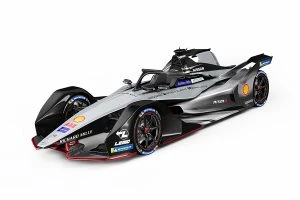Where is Motorsport Currently Found on the EV Map?

Formula E racing car.
Traditionally, the latest cutting-edge technology finds its way into road cars via the heat of motor racing. We are seeing EV racing going big quickly with the relatively recent Formula E championship, but how many motor racing championships are looking to EV technology for their future racing blue-print? As yet, EV motor racing technology hasn’t made its way into the everyday life of most average Australian motorists. Most of us still drive a motor vehicle with a healthy internal combustion engine, and most of us won’t be intending or even considering buying an expensive EV as an everyday means of transport anytime soon.
Supercars are continuing to investigate implementing hybrid technology into its racing schedule.
Formula One has had its engine regulations tweaked further with the aim of promoting closer racing and more balanced competition, as well as bringing economic and sporting sustainability to Formula 1. So, the cars are now flashier and more visually alluring, with the reshaping of the front and rear wings looking good. Formula One has a target to be net zero by 2030, and the way this is to be achieved is by removing single use plastics from its events, in collaboration with its circuits. Formula One won’t be going electric but will stay hybrid, and this has been a definite decision that the ‘powers that be’ have taken for the good of the automotive industry as they keep their racing car platforms relevant for future road cars. Formula One does not see electrification as the new world-religion, and it has stated that EVs are definitely not the only way to move forward with cars. Hybrid technology is Formula One’s current future objective, where the 2025 engine-unit will be hybrid and using 100 % sustainable fuels. Formula One sees a need to reduce the costs of this new engine-unit and platform so that it is affordable and less complex, which will open up huge potential for original equipment manufacturers (OEMs) to use in other applications for road cars.
In the World Rally Championship, current hybrid engine regulations from 2022 through to 2025 is all go, which introduces hybrid technology to the fastest cars on gravel. The hybrid technical regulations are a long way from being finalised, but initial talks have mooted a ‘supplementary hybrid system’ which controls components and software. The proposed hybrid units would allow WRC cars, which will retain the 2017 aero and engine package, to run as full EVs on transit stages, while providing a power boost on competitive special stages. Following 2025, the plan is to open up the rules to allow manufacturers to use their own electric systems for racing.
Formula E
Formula E is going from strength to strength, with Mercedes-Benz and Porsche recently joining the grid. Formula E, officially the ABB FIA Formula E World Championship, is a single-seater motorsport championship for electric cars (EVs). The series was conceived in 2011 in Paris. Formula E is the biggest motor racing event solely focussed on EV racing alone, where it is the proving ground and platform to test new ev technologies, drive development to the production line, and put more EVs on the road.
Using the sport as its showcase, the ABB FIA Formula E World Championship is sending the biggest message out to the world that may help alter perceptions and speed-up the switch to electric, in a bid to counteract the so-called “climate crisis” as well as addressing the effects of air pollution – particularly in cities. Sure, Formula E is the fastest-growing series in motorsport because its also the newest; however, it is certainly going to help put EV technology out there on the roads, even if most current EV buyers are either famous and or high-end earners.
Some electrification in motor racing is happening, where we’re seeing classes like the British Touring Car Championship, IndyCar, IMSA, NASCAR and World Rallycross Championship having some sort of hybrid or fully electric rules etched into the near-future pipeline. This is all good, but the reality is that most motorists in the general public will still be driving a car with a combustion engine, or combustion engine with hybrid technology, or a car with a combustion engine running on bio fuels in a decade because of the price of a new EV being way too steep, the lack of an EV infrastructure another, the cost of developing a country’s power grid worthy of supporting the power drain of a big EV fleet, EV battery life span, and the list goes on…
All of the many negative attributes that can be accredited to EVs aside, there are some fascinating new technological developments in hybrid and ev technology unfolding within motorsport itself.